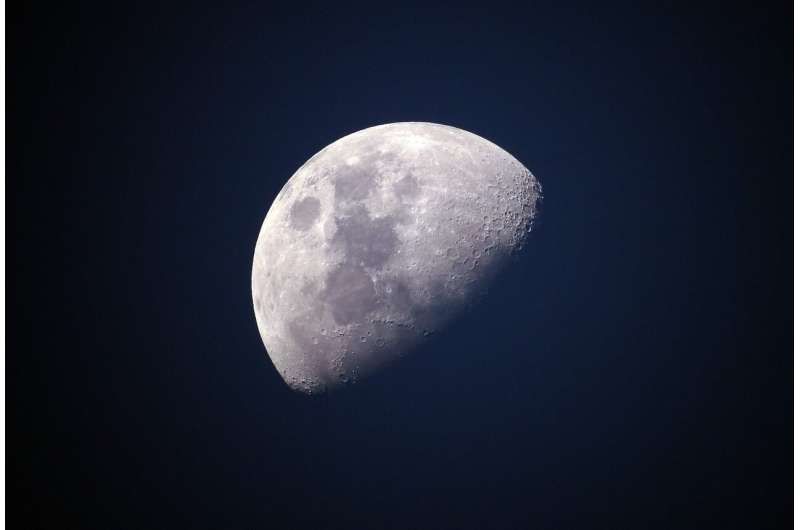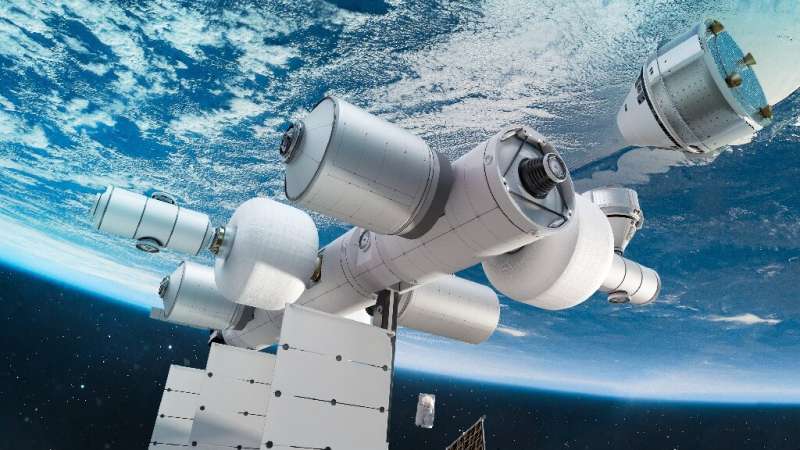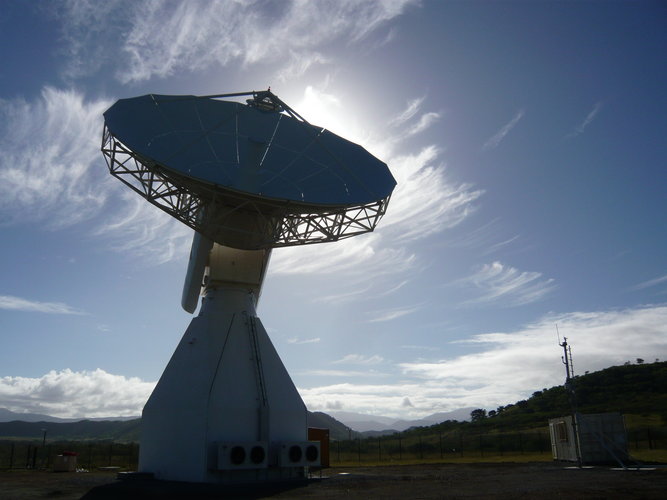
Copernical Team
NASA Mars Rover and Helicopter models to go on national tour
 Catch Mars mania as a traveling exhibit visits more than a dozen towns across the U.S. with lifelike models of NASA's Perseverance rover and Ingenuity helicopter.
While NASA's Perseverance rover and Ingenuity Mars Helicopter are hard at work exploring Mars hundreds of millions of miles from Earth, their "twin" models will be visiting museums as part of the "Roving With Perseverance" roadsh
Catch Mars mania as a traveling exhibit visits more than a dozen towns across the U.S. with lifelike models of NASA's Perseverance rover and Ingenuity helicopter.
While NASA's Perseverance rover and Ingenuity Mars Helicopter are hard at work exploring Mars hundreds of millions of miles from Earth, their "twin" models will be visiting museums as part of the "Roving With Perseverance" roadsh A world without access to space
 Over the last several years we have been yelling and screaming about the existential threat of space debris on our ability to conduct space commerce, but the world is not listening. Instead, several organizations continue to add new spacecraft to the near-Earth space environment while totally ignoring the ultimate consequences.
Just over the past 18 months the population of low-orbiting ac
Over the last several years we have been yelling and screaming about the existential threat of space debris on our ability to conduct space commerce, but the world is not listening. Instead, several organizations continue to add new spacecraft to the near-Earth space environment while totally ignoring the ultimate consequences.
Just over the past 18 months the population of low-orbiting ac Blue Origin, partners announce plans for private space station
 Jeff Bezos announced plans on Monday for Blue Origin to run the world's first private space station called the Orbital Reef, which would serve as a space business park and a regular destination for space tourists.
Blue Origin will partner with a Sierra Nevada Corp. subsidiary called Sierra Space, along with Boeing, Redwire Space and Genesis Engineer to make the space station happen.
Jeff Bezos announced plans on Monday for Blue Origin to run the world's first private space station called the Orbital Reef, which would serve as a space business park and a regular destination for space tourists.
Blue Origin will partner with a Sierra Nevada Corp. subsidiary called Sierra Space, along with Boeing, Redwire Space and Genesis Engineer to make the space station happen. New far-out NASA 'travel' video: kayaking on Titan, skydiving on exoplanet
 NASA knows people can't travel to exoplanets light-years away, but the space agency hopes a new, highly fictionalized video will inspire dreams of such far-off travel.
The video depicts wild, even wacky, scenes of people kayaking in deadly methane lakes on Saturn's moon Titan, skydiving on exoplanet HD 40307-g, which is 42 light-years away, and watching twin suns on Kepler-16b - 200 li
NASA knows people can't travel to exoplanets light-years away, but the space agency hopes a new, highly fictionalized video will inspire dreams of such far-off travel.
The video depicts wild, even wacky, scenes of people kayaking in deadly methane lakes on Saturn's moon Titan, skydiving on exoplanet HD 40307-g, which is 42 light-years away, and watching twin suns on Kepler-16b - 200 li NASA's uncrewed Artemis moon mission set to launch in February

NASA's uncrewed Artemis 1 mission to the moon is on track to launch in February, the U.S. space agency said.
The Orion spacecraft was secured this week atop the powerful Space Launch System rocket at NASA's Kennedy Space Center in Florida, meaning the mission was entering its final phase of preparations.
For its flight next year, Orion will swing around the moon without astronauts on board.
It will be a critical test of the Artemis program, which aims to land astronauts on the moon by 2024 and establish a sustained human presence there by 2028, part of the U.S. government's ambitious efforts to get people to Mars in the 2030s.
Artemis has been hit by delays, and even top NASA officials have conceded that the targets will be difficult to meet.
A specific launch date for Artemis 1 will be set after "wet dress rehearsal," a test set for early next year in which the liquid propellants are filled into the massive next-generation rocket, which at 98 meters stands taller than the Statue of Liberty.
The United States remains the only country to have put humans on Earth's nearest neighbor.
Bezos' Blue Origin announces plans for private space station

Jeff Bezos' Blue Origin on Monday announced it wants to launch a space station that will house up to 10 people in the second half of the decade, as the race to commercialize the cosmos heats up.
"Orbital Reef," described in a press statement as a mixed-use business park in space that will support microgravity research and manufacturing, is a joint venture with commercial space company Sierra Space and has the support of Boeing and Arizona State University.
"For over sixty years, NASA and other space agencies have developed orbital space flight and space habitation, setting us up for commercial business to take off in this decade," said Blue Origin executive Brent Sherwood.
"We will expand access, lower the cost, and provide all the services and amenities needed to normalize space flight.
Galileo Control Segment upgrade ready for next launch

A significant first for next month’s 11th Galileo launch: thanks to an upgrade of the world-spanning Galileo Control Segment, this will be the first launch where the satellites ‘ first steps into space will be overseen from an existing Galileo Control Centre, rather than requiring an external mission control site.
Folding clothes in space
 Video:
00:02:21
Video:
00:02:21
ESA astronaut Thomas Pesquet is sharing scenes from life on board the International Space Station during his second mission “Alpha”. Some things are easier without gravity getting in the way, some things are more difficult in weightlessness. Folding clothes is one of the more difficult things to do! Luckily astronauts in space do not have to do any washing or ironing, they use their t-shirts until dirty (generally after two weeks) and then wear new ones. Thomas shared this video on social media with the caption:
“Folding clothes in space is... hard! Luckily we don't need to most
Aurora under technology
 Video:
00:01:27
Video:
00:01:27
Timelapse video made during ESA astronaut Thomas Pesquet’s second mission to the International Space Station, “Alpha”. The camera is setup to take pictures at intervals of two a second, and the pictures are then edited into this video that plays at 25 pictures a second. The video is around 12 times faster than real speed.
Thomas shared this video on social media with the caption:
“Sometimes aurora seem to creep over the horizon and envelop our globe. Under the technological powerhouse of Canadarm, the Station's solar panels and one of our radio antennas, this timelapse passes the aurora so
Cloudy timelapse over Baja California
 Video:
00:02:26
Video:
00:02:26
Timelapse video made during ESA astronaut Thomas Pesquet’s second mission to the International Space Station, “Alpha”. The camera is setup to take pictures at intervals of two a second, and the pictures are then edited into this video that plays at 25 pictures a second. The video is around 12 times faster than real speed.
Thomas shared this video on social media with the caption:
“Soar over Earth for timelapse Tuesday: clouds, clouds, Baja California, and more clouds. There are often many clouds covering our planet!”
Over 200 experiments are planned during Thomas’ time in space, with 40 European ones
